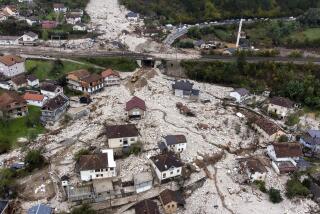Rescuers Rule Out 2nd Mission to Croatian City : Yugoslavia: Fighting eases, but a medical team says it is still too dangerous to try to evacuate more of Vukovar’s wounded.
BELGRADE, Yugoslavia — Despite a slight letup in fighting Sunday, Western medical volunteers decided that conditions around the besieged city of Vukovar remained too dangerous to chance a second mercy mission to evacuate wounded from the front lines of Yugoslavia’s civil war.
The international aid organization Doctors Without Borders managed after a harrowing 13-hour journey through the Serbian-Croatian war zone to rescue 109 seriously injured patients from Vukovar’s shattered hospital Saturday.
Fighting eased Sunday in most of ravaged eastern Croatia, where a steady rain pelted the region and seemed to dampen enthusiasm for further battles among the fatigued combatants. Croatian Radio reported only sporadic gunfire around Vukovar.
But after a day of dodging artillery fire and army roadblocks, the medical rescue workers decided against an immediate second attempt to evacuate some of the remaining 200 wounded fighters in Vukovar, the Tanjug news agency reported.
Peace talks between Croatian officials and the Yugoslav army, which has backed Serbian militants fighting Croatian independence, reconvened in the Croatian capital of Zagreb on Sunday, but there was no word of any breakthrough.
Those negotiations had led to orders by Croatian President Franjo Tudjman and federal Defense Minister Veljko Kadijevic for a weekend cease-fire to allow the medical mission into Vukovar.
The orders were often defied, however, and the ambulance caravan was fired on repeatedly during its daylong journey. Two nurses were badly injured when the truck they were riding in struck a mine.
Army officers manning roadblocks around Vukovar also forced the convoy to take numerous detours, turning what should have been a 25-mile trip into an ordeal that ended early Sunday when the vehicles arrived at a field hospital in the village of Novi Mikanovci.
Martin Mossinkoff, a spokesman for Doctors Without Borders, told reporters in Zagreb that a 60-year-old man with third-degree burns died six hours after arriving at the field hospital, the Associated Press reported.
Most of those evacuated were Croatian police officers or members of the republic’s national guard.
Some of those rescued told reporters that hardly a building was left habitable in Vukovar, the scene of continuous battle since early September between Croatian national guardsmen and Serbian-controlled federal forces.
“The town has been destroyed. It isn’t there any more,” Dario Topuljnjak, an injured police officer, told Reuters news agency in Novi Mikanovci. “There is no food, no water, no electricity. The people are tired, but they will never give up. They will fight to the last.”
About 15,000 Croats remain holed up in shelters in Vukovar, once a city of 50,000 people. The Serbian rebels want Vukovar because it is an important part of the eastern Croatian region of Slavonia they have otherwise conquered and wish to annex to a Greater Serbia that is emerging from Yugoslavia’s ruins.
Croatian fighters have put up a determined defense of the city, which has become a symbol of resistance to the Serbian advance and a possible turning point in the war.
About 2,000 people have been killed and one-third of Croatian territory has been seized by Serbian rebels and the federal army since Croatia and Slovenia declared independence June 25.
Serbs account for about 12% of Croatia’s 5-million population, and many oppose independence because that would separate them from other Yugoslav Serbs.
Federal forces also attacked Slovenia after its move to secede. But the Slovenes--poorly armed but well organized--dealt the army a humiliating defeat in less than two weeks of fighting, winning a mid-July promise by Belgrade to withdraw its troops within three months.
That deadline passed Friday, with about 3,000 Yugoslav soldiers still in Slovenia. Local media have reported that full withdrawal has been put off by a week, primarily to look for ways of moving out the federal soldiers without their having to travel through neighboring Croatia.
Zagreb fears that the retreating forces might join the tens of thousands of federal troops already in Croatia, reinforcing the units fighting against the republic’s national guardsmen.
More to Read
Sign up for Essential California
The most important California stories and recommendations in your inbox every morning.
You may occasionally receive promotional content from the Los Angeles Times.









